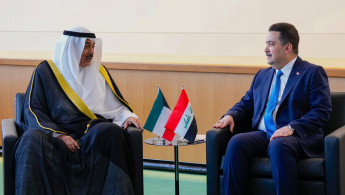Iraq-Kuwait ties strengthen despite lingering major disputes on border and energy
Iraq and Kuwait are striving to reinforce their diplomatic and economic relations, despite persistent challenges over unresolved issues related to maritime boundaries and contested natural resources. Both nations have expressed a mutual desire to deepen cooperation, moving beyond historical grievances to foster regional stability and collaboration.
During a meeting on the sidelines of the 79th session of the United Nations General Assembly in New York on Sunday, Iraqi Prime Minister Mohammed Shia' Al-Sudani and Kuwaiti Crown Prince Sheikh Sabah Khaled Al-Hamad Al-Sabah reaffirmed their commitment to strengthening the relationship between the two neighbouring countries.
According to a statement from the Prime Minister's Media Office, Al-Sudani highlighted the historical ties between Iraq and Kuwait, underscoring his government's determination to enhance cooperation with Arab neighbours, particularly Kuwait.
The two leaders discussed the need to resume joint technical committees to address key areas of mutual interest, such as economic collaboration, security, and infrastructure. These committees are seen as essential mechanisms to tackle long-standing issues and to push forward practical cooperation that benefits both countries.
However, the relationship between the two nations remains shadowed by unresolved territorial disputes, including the demarcation of the Khor Abdullah waterway and claims to the Durra gas field. These issues have deep historical roots, with the Khor Abdullah waterway serving as Iraq’s only direct access to the Gulf, a critical route for the export of oil and the import of goods.
Ihsan al-Shammari, a professor of political science at Baghdad University, praised the current state of Iraqi-Kuwaiti relations, describing them as having reached "their peak" in recent years. "Kuwait has played a key role in supporting Iraq's political, economic, and social pathways since 2003," Al-Shammari told The New Arab.
"Although some disputes remain unresolved, they have not hindered the overall development of bilateral relations between the two countries. These issues, inherited from the Saddam Hussein regime, are nearing resolution thanks to a strong commitment on both sides," Al-Shammari added.
Al-Shammari also noted that Kuwait has displayed flexibility in its approach to Iraq, particularly with regard to longstanding disputes over maritime boundaries and natural resources. "There is a genuine willingness from both countries to resolve these issues through dialogue, rather than resorting to international arbitration," he said. He pointed to Kuwait's hosting of an international donors' conference in 2018 as a key example of the country's ongoing support for Iraq's recovery and rebuilding efforts.
Lingering challenges
In a ruling last year, Iraq's Federal Supreme Court annulled a 2013 law ratifying a 2012 agreement on maritime navigation in Khor Abdullah, citing the need for a two-thirds parliamentary majority for ratification. The ruling reignited tensions over the waterway, with some Iraqi politicians arguing that the agreement compromised Iraq's sovereignty.
Kuwaiti officials, however, have maintained that the court's ruling does not invalidate the agreement, which is based on past United Nations Security Council resolutions. Kuwaiti lawmakers have called for further discussions with their government to address the implications of Iraq's court decision.
Another point of contention is the Durra gas field, which lies at the intersection of Iraq, Kuwait, and Saudi Arabia. Kuwait and Saudi Arabia assert exclusive rights over the gas field, which contains an estimated 220 billion cubic metres of gas reserves, while Iran also claims a share. Iraqi officials have indicated that Iraq also has a stake in the field, adding another layer of complexity to the dispute.
Despite these challenges, both nations appear committed to resolving their differences through diplomatic channels. Al-Shammari remains optimistic, suggesting that these disputes, while significant, are not insurmountable.
"The unresolved issues do not pose an insurmountable obstacle to the development of relations," he said. "Iraq needs Kuwait, as well as other Gulf nations, to solidify its standing in the Arab world. There is a strong will from both sides to resolve these matters through dialogue, and both countries have adhered to international resolutions while showing a willingness to find mutual ground."
As Iraq seeks to reintegrate into the Arab and Gulf political spheres following decades of conflict and instability, the resolution of these disputes with Kuwait may serve as a critical test of its diplomatic abilities and regional standing.





 Follow the Middle East's top stories in English at The New Arab on Google News
Follow the Middle East's top stories in English at The New Arab on Google News


